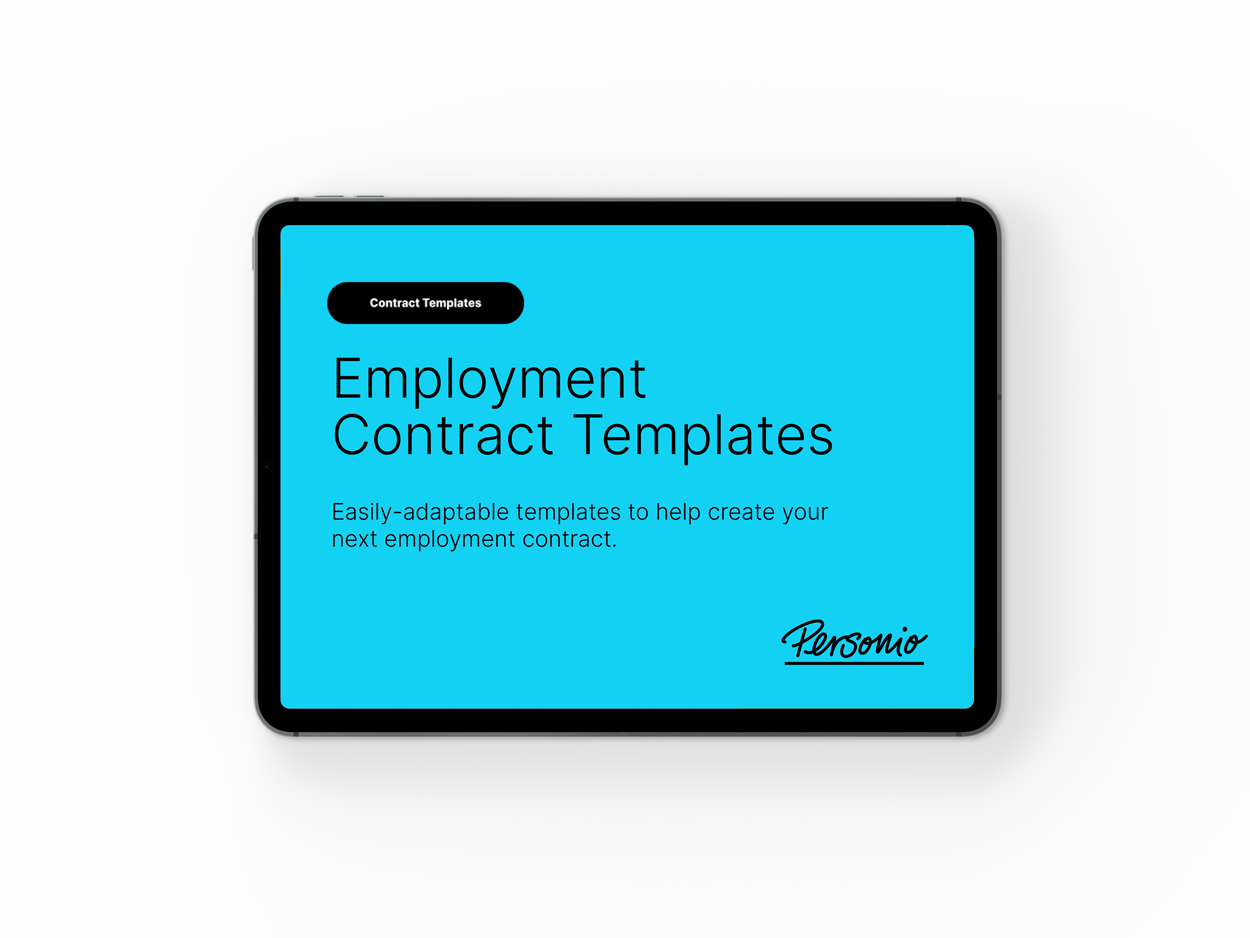Are You Using Probationary Periods Effectively?

What does it mean for employees to be in a ‘probation period’? Why does it matter? How long does it typically last in the UK? Are there any legal requirements or probation period laws you need to know?
A whole host of questions, with many different answers. In this blog, we address the key issues relating to probation periods, and how you can make sure they run efficiently within your organization.
Pen your next employment contract with our helpful selection of templates.What Is A Probation Period?
A probation period is something of a test period for new employees and employers. During this time, employees are exempt from certain contractual elements of their new role (for example, notice periods for termination) to determine if they are the right fit for their role.
When done properly, a probation period has an aspect of evaluation. Making sure that a new employee is a good fit for the role, that they are set up for success, and that they are a good cultural fit within the team. For this reason, and more, probation. periods can be incredibly valuable for HR teams and organizations (when done properly).
Probation Periods: Most Commonly Asked Questions
Before we begin in full, here are some answers to some of the most popular probation period questions out there. We hope they help add clarity to this important topic:
What Is The Typical Length Of A Probation Period?
For more new employees, in most organizations, the probation period is going to range somewhere between three to six months. Typically, this will help determine whether someone is the right fit for the organization.
How Long Should Your Probation Period Be?
It depends on your organization and business. For some roles, it might make sense to have a longer probation period to make sure that you ‘bake in’ the time spent learning the role. For other, more straightforward roles, it may make sense to have a shorter probation period.
Is A Probation Period A Legal Requirement?
It is not necessary to have a probationary period written into a contract, nor is it a legal requirement. But, employers can include a period of employee probation in a contract if they choose. If they do, Acas says they must include any conditions associated with the period and how long it is.
What Does UK Law Say About Probation Periods?
As it happens,there is no explicit, general law covering an employee’s probationary period. In fact, the Citizens Advice Bureau (CAB) says that "Legally, there’s no such thing as a probationary period. Once you’ve started work, the number of weeks you’ve worked begins on the day you started, not from the time when your probationary period ended."
However, there is a large difference between general law and contract law. And in this case, the contract is king. Even the CAB acknowledges that employers can extend probationary periods as long as the contract allows this. ESPHR says, “Although the probation period itself does not automatically create any special status of the employment relationship it can be used to expressly alter some standard terms which are deemed to apply only during the probation period itself”.
In other words, it can include certain restrictions. For example:
On whether an employee can take leave
What activities they need to undertake or behaviours they need to demonstrate,
Possibly even limit access to non-statutory benefits during the period that they might be entitled to receive once their probation is over.
Download: Employment contract templates

We took the time to create some helpful, UK-specific employment contract templates to help your organisation sign your next great hire. Download them today for free.
Download them nowWhat Are The Benefits Of Probation Periods For HR?
It’s best to think of a probation period not as a test, but as a review. This is an employee’s chance to prove that they know what they are doing and that all of the hard and soft skills they detailed in their interviews are correct.
Essentially, your probation period is a safeguard against any mistakes made during the recruitment process. This could be mistakes made by an interviewer or hiring manager (not asking the right questions) or by the applicant (not offering a fair reflection of their skills or capabilities).
Within a probation period, you can determine if an employee:
Has the correct skills for the job they have been offered.
Are diligent when it comes to showing up, tracking hours, or completing their work.
Gets along with their colleagues and collaborates in a productive fashion.
In the end, whether at the end of the probation period or sooner, you may be able to dismiss an employee based on their lack of abilities or performance in their role. Of course, this is not all-encompassing as you cannot fire an employee for just any old reason, but you can determine if they are a good fit for their specific role and responsibilities.
Manage Employee Files the Easy Way

Ensure with Personio that personnel documents are stored correctly, completely, and in compliance with legal requirements at all times.
Learn more hereHow Do You Manage Employees During Their Probation?
A probation period should not be viewed as an unimportant matter, for multiple reasons. First, employees need to know why they are within the probation period and what is to be expected of them.
This boils down to outlining what is expected of them before, during, and after their probation period. Clear expectations need to be set for where employees should be successful, where they should showcase development, and what they can do to ensure they get the training and skills they need to thrive (if necessary).
Think about it like this: As an HR professional, having check-ins with employees during their probation period can determine two key factors:
If they are thriving in their role and what support they might need to do better.
Whether your company’s culture is a good match for their working style.
Don’t forget: it is not simply the employee on trial, it is also your recruitment processes. A failed employee means that, at some point in the process, something may have been unclear or articulated in a way that didn’t get to the heart of the matter.
A few years ago, research revealed that more than a third of UK employees intended to have left their jobs in the first six months of that year. While it is hoped that your company doesn’t have a hostile work environment (the reason that 61% of respondents said they would leave a job within 12 months according to this infographic).
Putting a probationary period in place does give employees the flexibility to leave with shorter notice periods, as much as it gives employers the chance to let them go if they aren’t doing the job properly.
How Do You Put Together A Probation Policy For Employees?
To determine how employers should set out the contract relating to probationary periods, here’s some information from RocketLawyer: Probationary periods are normally included as a clause in the main employment contract. This clause should clearly set out the terms of the probation period including:
How long it lasts;
The notice period that will apply for the duration of the probation period (this must be at least the statutory minimum of one week for new employees); and
The method of assessing whether a new employee has passed or failed their probation period (e.g. holding a performance review meeting).
As well as including a probation period clause, it is important to ensure that new recruits are fully aware of this clause and understand its implications.
Helpful Reminders For Employee Probation Periods
Before we leave you off for the day, here are some final things to keep in mind when it comes to probation periods and probationary policies. Let’s consider this:
Use structure effectively so that you can be shown to accurately assess an employee’s abilities.
Make sure you diarise the end of the period so an assessment can be made before it ends.
Be aware that you can extend the probation period if employees haven’t adequately demonstrated their abilities.
This might be necessary if they are absent a lot during the probation period, or it’s unclear whether they have met the requirements. Or, if you’re just not 100% certain that they’re the right fit for you.
If you do this, make sure that you do what ESPHR recommends, namely, document this, in writing. Be sure that you extend the probationary period explicitly as “a change to contractual terms and conditions and signed by the employee to confirm their express agreement”.
If employees are dismissed during their probationary period make sure you deal with it fairly, reasonably and – if possible – use a standard disciplinary procedure. Whatever you do, make sure you keep a paper trail (or a digital version of this), as you would for dismissing any employee.
Once an employee has passed their probationary period, they’re officially one of the team! Some organizations might like to celebrate this. Others prefer not to shout about it as, in some cases, it might have been necessary to dismiss employees during the period and they’d rather not call attention to the fact that not everyone works out.
Probation Periods Made Simple
Once an employee is on board and you’re happy that they are great team members, be sure that you hold on to your top performers. To find out more about how to do this, you might like to take a look at this blog post about motivating your employees, or this one about measuring and improving employee performance and engagement in tough times.
But no matter what you do: please keep records of all employment-related processes! Personio can help digitize all your HR processes and even provide helpful workflows to make it easier.

